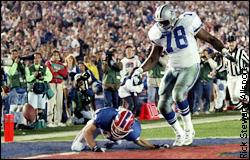| | Mistakes? I've made a few. Attending Super Bowl Ay Yay Yay between the Dallas Cowboys and Buffalo Bills, to select just one example.
Attending just about any other Super Bowl in history, to select another.
|  | | Don Beebe stripped Leon Lett late in a mistake-plagued Super Bowl XXVII. |
I remember the game between the Cowboys and Bills -- it was at the Rose Bowl, Roman Numeral XXVII, final score 52-17 for those keeping book -- for two very specific occurrances: (1) Michael Jackson performing; and (2) the Bills not. But the passage of time, I think, has been kinder to the memory of those Buffalo teams than to the Hyperbaric One.
After all, what does the Bills going to four straight championships and ignobly losing all four really represent, if not the basic futility of asking the Super Bowl to live up to its name? In the great maw of history, Buffalo's shuffle through the Big Dance was but one of many.
The Bills didn't even set the trend. This thing literally started at the beginning, with football's Big Bang -- the first-ever unification bout between the old NFL and fledgling rival AFL -- almost instantly producing a ratio of duds to dandies that would embarrass anyone not named Don King.
People talk about how the Jets' 16-7 Super Bowl III upset of the Baltimore Colts in 1969 opened the door for the merger of the leagues, and there's no disputing that. But equally undeniable is that the two "World Championships" preceding it were flat bombs, the Green Bay Packers winning them by a combined 44 points.
And that has been the pattern, roughly -- a good game every third or fourth year, with two or three interminable dogs in between. In a century's worth of memorable bad games from sports near and far, the Super Bowl, based upon percentage, has to be the unhappy leader in the clubhouse.
The question is, why?
Is it format? Through most of its young history, the Super Bowl has been a game separated by two weeks from the rest of the NFL season, and one popular theory holds that given two weeks to prepare for a single opponent, one organization or the other will do a vastly superior job of it. Decent theory, but it's about to go down the tubes: Three of the next four Supers will occur a week after the conference championships, and I guarantee you at least two of those games will be over before you can say, "Here, lemme freshen that Zima."
|
Super? Bowl history
|
|
The hype may be super, but the games usually aren't:
I: Packers 35, Chiefs 10
II: Packers 33, Raiders 14
III: Jets 16, Colts 7
IV: Chiefs 23, Vikings 7
V: Colts 16, Cowboys 13
VI: Cowboys 24, Dolphins 3
VII: Dolphins 14, Redskins 7
VIII: Dolphins 24, Vikings 7
IX: Steelers 16, Vikings 6
X: Steelers 21, Cowboys 17
XI: Raiders 32, Vikings 14
XII: Cowboys 27, Broncos 10
XIII: Steelers 35, Cowboys 31
XIV: Steelers 31, Rams 19
XV: Raiders 27, Eagles 10
XVI: 49ers 26, Bengals 21
XVII: Redskins 27, Dolphins 17
XVIII: Raiders 38, Redskins 9
XIX: 49ers 38, Dolphins 16
XX: Bears 46, Patriots 10
XXI: Giants 39, Broncos 20
XXII: Redskins 42, Broncos 10
XXIII: 49ers 20, Bengals 16
XXIV: 49ers 55, Broncos 10
XXV: Giants 20, Bills 19
XXVI: Redskins 37, Bills 24
XXVII: Cowboys 52, Bills 17
XXVIII: Cowboys 30, Bills 13
XXIX: 49ers 49, Chargers 26
XXX: Cowboys 27, Steelers 17
XXI: Packers 35, Patriots 21
XXXII: Broncos 31, Packers 24
XXXIII: Broncos 34, Falcons 19
|
Is it the odds? In pro basketball, baseball and hockey, one team has to beat the other one four times to be declared champion. It's the most ingenious playoff contraption ever devised: It takes time, it usually holds fans' sustained interest, it collapses the effect of a single rout or lopsided game, and it simultaneously puts all the pressure on a single game and makes it possible for that game, once decided, to be left behind for another pressure-packed event.
No go in football, where such a format just isn't feasible. And so the NFL has to take what it gets, hoping against hope that the sheer force of a single, winner-take-all confrontation will somehow wring great performances from the guys on both sides of the line of scrimmage.
Three decades and change later, the verdict: Nope. Tremendous try, though.
Blindly dropping my finger down onto a page of results out of the last Super Bowl program, I hit the year 1974 and count off the next four championship finals: Miami 24-7 over Minnesota; Pittsburgh 16-6 over Minnesota; Pittsburgh 21-17 over Dallas; Oakland 32-14 over Minnesota.
Perfect. Randomly perfect. A good game, an OK game and a couple of yawners. A dominant predator (the Steelers, in their heyday), a relative sad sack (the Vikings, unable to win it all despite being getting to the Super Bowl three times in four years), and historical symmetry. Bloody perfect.
No matter what decade you drop in on, this game is a ready threat to put you to sleep. The finger falls on the page to 1984. Four straight results: The Raiders 38-9 over Washington; San Francisco 38-16 over Miami; the Bears 46-10 over New England; the Giants 39-20 over Denver.
Look, Ma, no contest.
And let's take it to the next logical level and declare a media disaster zone: The Super Bowl is so absolutely saturated with analysis, prediction, trivia, pregame shows, key player arrests on the eve of the game, guys taking off in spacesuits and KISS reunion-tour performances that it's a wonder anyone's still standing to actually snap the ball and play.
The players no longer like the Super Bowl. Oh, they like getting there. They like being there. They like being winners, at least until that final Sunday. But Super Bowl week itself, with its paralysis by analysis? These guys treat it like a heat rash.
For seven days, or 10, or 13 or 14, they are laid bare before a sporting public that clearly still has an appetite for all things Super. They talk and they talk and they talk, but they don't say anything anymore. With the occasional amazing exception, the average modern player spends the better part of a fortnight playing down the biggest game of his life. Come again?
And, Lord, the '90s? May they pass quickly, before anyone is tempted to revisit.
In that 52-17 failure to achieve victory in Pasadena, the Buffalo Bills committed nine turnovers -- and the lasting image of the evening, aside from the part about Michael Jackson, was of the Bills' Don Beebe chasing down Leon Lett and punching loose the ball as Lett tried to showboat his way into the end zone after scooping up yet another Buffalo giveaway.
In that moment, Beebe marked himself as a man willing to play for pride. And in that same moment, an entire sporting nation was moved to lean toward the TV screen, mull this proud image and say to itself, "Is 'The Simpsons' on yet?"
The century ends. But beware: Bad games, the really, really bad ones, come with no expiration date.
Mark Kreidler of the Sacramento Bee is a regular contributor to ESPN.com.
| |
ALSO SEE
The worst games
Worst uniforms
 |



